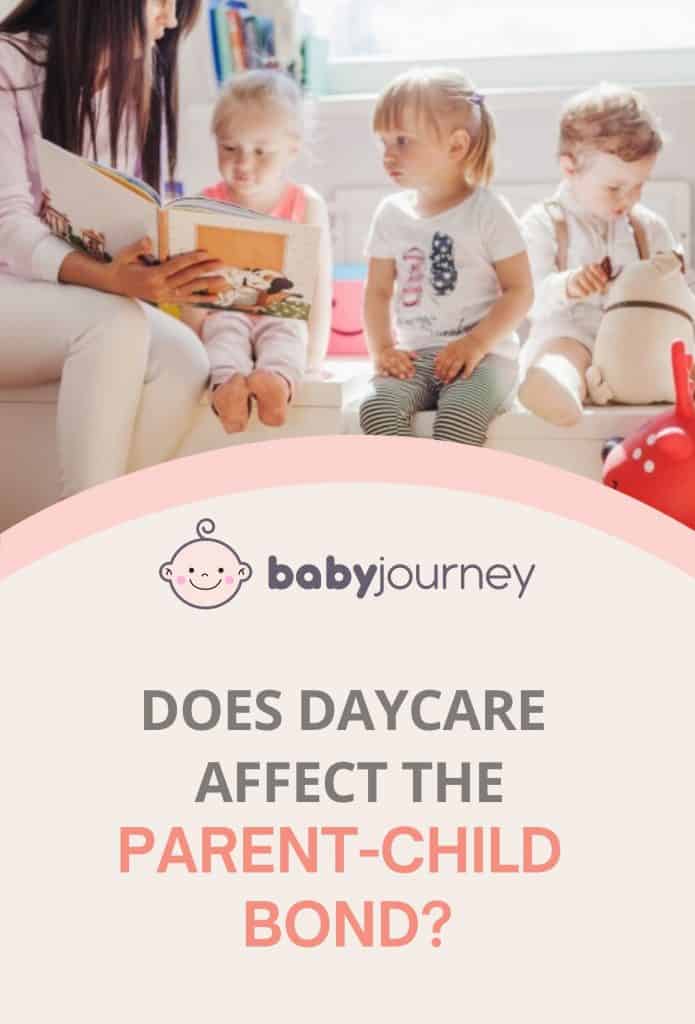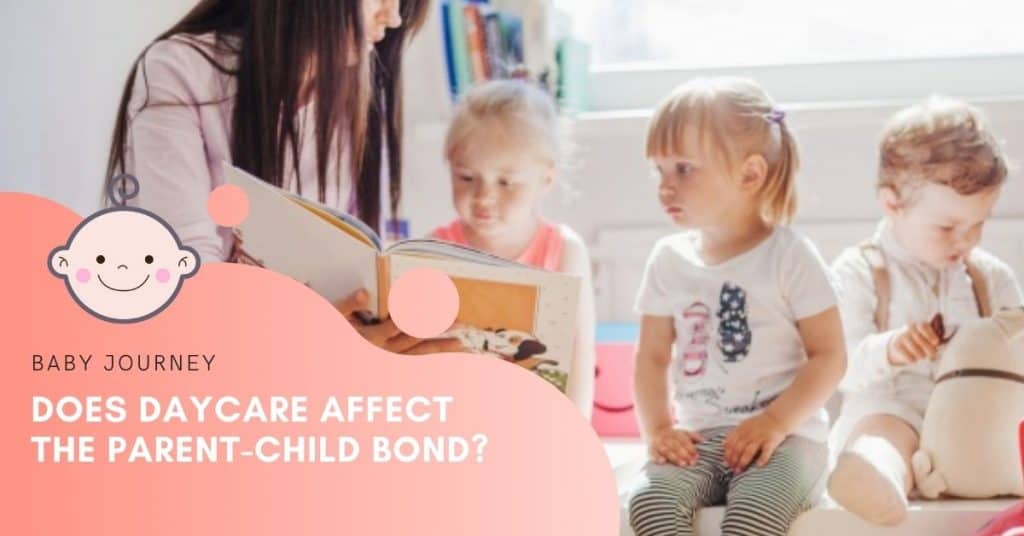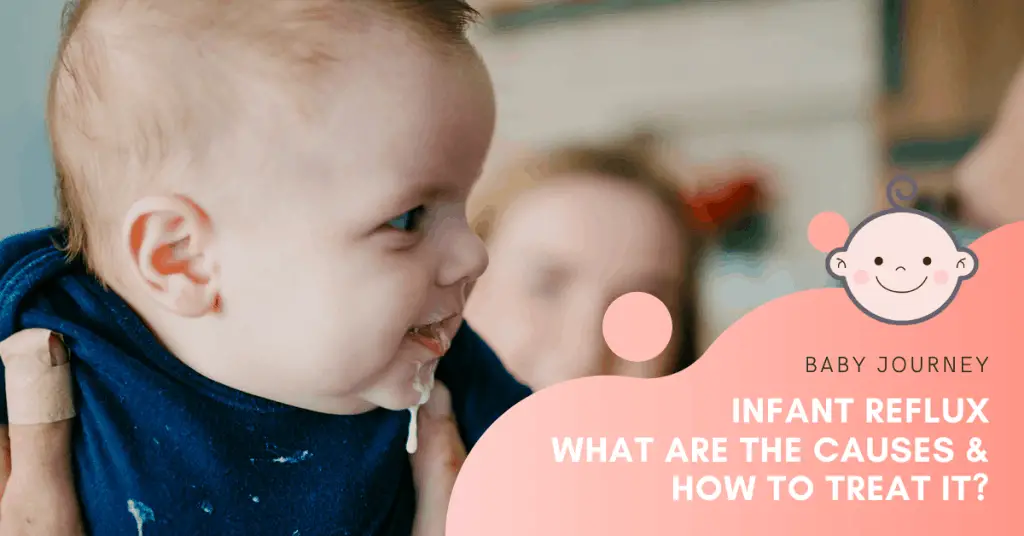What is Meant By Parent-child Bond? Why is parent-child bonding important?
The parent-child bond or parent-child relationship, is the bonding between a child and parent that helps with the child’s growth in terms of physical, emotional and social developments.
The parent-child bond starts forming immediately after a baby is born. From their first day of life, children need a secure attachment to feel loved and protected.

Some parents prefer that one of them stays at home to take care of the child while other couples have to get back to work after a short leave and they rely on daycare to supervise and take care of their children in their absence.
When a child is taken outside of the home and placed in a new environment with adults and other children that he or she doesn’t know, for longer hours, then the child may develop unsettling feelings.
It’s up to the parents to fortify a positive parent child relationship with their child and not let it be damaged due to the daily separation.
To find if and how much the parent-child relationship is affected by this change, we hired Minuca Elena to reach out to 40 parenting bloggers and family therapists, and ask them the following questions:
Do you believe that the bond between parents and their child is affected if the child starts attending daycare from an early age (as a toddler)? How could parents prevent this to happen?
Without further introduction let’s see what the experts had to say.
- Elaine Taylor-Klaus – Impact Parents
- Leisa Papa – Little Kids Business
- Tovah Klein – Barnard College Toddler Center
- Kate Fraiser – Connect Point Moms
- Lorie Anderson – Mom Informed
- Leigh Ellen Magness – The Inherent Parent Coach
- Dr. Angela Kenzslowe – Purple Heart Behavioral Health
- Allie Edwards – The Perfect Pregnancy Plan
- Emilie Mason – Anglo-American School of Sofia
- Karen Gross
- Dr. Kathy Nickerson
- Sarah Hurst – Arthur Wears
- Erum Zehra – Muslim Moms
- Neferteri Plessy – Single Moms Planet
- Jessica Speer Author
- Alice Anderson – Mommy To Mom
- Amelia Zamora – Mama Bear Reviews
- Hayley Gallagher – The Centered Parent
- Caitlyn Scaggs – Boldly Pursue
- Jeanette Yoffe – Yoffe Therapy
- Debbie Rivers
- Jaya Jaya Myra
- Siobhán Alvarez – Mimosas & Motherhood
- Dr. Kevon Owen
- Tiffany Schneider – Life Change Advice
- Gennifer Rose
- Mo Mulla – Parental Questions
- Heather Little – Mom Thoughts
- Jason Leung – The Rockstar Dad
- Allie Schmidt – Disability Dame
- Tracy Murdock – Your Twin Mom
- Jacqui Olliver – End The Problem
- Ariella Lew – Kids on Track
- Michelle Meredith – Bright Color Mom
- Nicoleta Iudean – What Do Kids Want
- Adam Shlomi – SoFlo Tutors
- Michael Fray – Yearist
- Dana Basu – Ever Grow Therapy
- Shana Bull – Randall the Blue Spider Goes Surfing
- Kate Tekurio – Kateable
Elaine Taylor-Klaus – Impact Parents

Parents’ separation from kids at any age, especially when it’s short-term (like daycare), can actually be an opportunity to reinforce connection and love. If a parent is generally a consistent presence in a child’s life, then a separation like pre-school should not cause a long-term problem.
In fact, if the parent is available to show love and attention after the separation, this can actually reinforce the bond between the parent and child. So make the effort to be present at and after pick-up. Don’t get on your cell phone and start talking to friends. Instead, connect with your child, understand your child’s feelings and learn to foster mutual respect.
Let them know that you see how capable they are. Encourage their resilience. Reinforce their capacity for independence and ask them to tell you about their day. Your child’s ability to see themselves as part of you, and still able to separate and reconnect with you, is an essential life skill for them to develop.
Leisa Papa – Little Kids Business

As the Mother of two children who started daycare part time from age 2, I do not feel that the bond between parent and child is affected if the child starts daycare as a toddler.
Parents are there when they wake up and there when they go to bed. We are the person they turn to as they age as a trusted permanent figure in their lives.
I recall my son’s first day to care and although I felt really nervous for him and struggled a little with letting go, his attendance at care taught him that Mummy and Daddy will always come back. It made Nanna babysitting and outings to dinner occasionally possible as he was used to us going away and coming back.
With both of my children in Primary School, a resilient nature is fondly looked upon and encouraged. Teachers appreciate my childrens’ capacity to recover quickly from little upsets and I believe that this is a quality they learned in those early years of childcare, which help each child exhibit optimistic behaviors.
When you are with your child, it is important to be truly present. Don’t let the television babysit and pay attention to the little things. Be the person who teaches them to walk and complete simple tasks.
Teach them manners and the importance of owning their mistakes and saying sorry to friends. As each day passes, you are sure to see a little more of yourself in your child’s actions.
Tovah Klein – Barnard College Toddler Center

When both parents work outside of home, a loving, sensitive adult is needed to fill in for the role of caregiver during these hours.
The attachment bond between a parent and child is unique and runs deep. Children develop their sense of self and views of others through this enduring bond. They learn to trust others and rely on the security of that relationship to help them develop in healthy ways. There is no reason that time spent in daycare must hurt this bond.
In fact, research shows us that it is hard to disrupt that bond, even with less than optimal child care. What children need, and parents can look for, is child care with nurturing, responsive adults and not too large a group of children.
This way, a toddler’s needs are sensitively attended to in the absence of the parent, the child is reminded that the parent will return and the child can celebrate their return with a loving and happy coming back together.
This is not harmful to the child, in fact, it shows that child that more people can be loving and kind to them, reinforcing the bond they develop in their primary relationship.
Kate Fraiser – Connect Point Moms

The bond between parent and child will be negatively affected if the child attends daycare from an early age for two reasons:
1. We are relational beings who internalize the presence of those around us and are shaped by them. Very young children are wired to connect with (or attach to) one or two primary adult caregivers.
A typical 9-hour daily stay in daycare will have children cared for by at least three adults. This leaves little room for parents as the child’s number one or number two attachment figure.
2. We all seek to answer the following two questions within the first three years of life (And the answers will affect every relationship we have for the rest of our lives): “Am I WORTHY of being loved/having my needs met?” and “Are OTHERS willing and able to love me/meet my needs?”
Receiving an affirmative answer decreases when more than one child are cared for by multiple caregivers.
The only way parents can prevent this from happening is to keep the hours at daycare as short as possible (less than five hours each day) and have as few primary caregivers as possible caring for your child. Establishing good communication habits in the family is also key to solid parent child relationships.
Lorie Anderson – Mom Informed

There’s definitely something that happens to the parent-child bond when the child starts attending daycare, especially if the child doesn’t have too much interaction with people other than their parents.
After all, if your child spends most of their time with you and a few other family members, going to daycare opens up a whole new world of interaction to them. They have all kinds of new positive relationships apart from you. They’re interacting with their daycare workers and other kids, so you’re no longer their entire world.
It’s essentially what happens when kids go to school. When you see your child off on the bus on their first day of kindergarten, it feels like “letting go” in a way, because you’re sending them off to have their own experiences and form new relationships. Putting them in preschool is basically the same process, but earlier in the child’s life.
Does this mean your child will stop loving you? Absolutely not. You’re still the most important person in their life. They won’t even be able to imagine a life where you’re not the most important person until they’re much older.
But, you may have to deal with bad habits or behaviors that they pick up from other kids, and they may not behave well in daycare, which you might have to talk to them about at home.
If you don’t handle these situations properly, it could affect your relationship in tiny ways, and even your child’s personality. But as long as you work through these issues with positive parenting in a calm, reasonable manner, it won’t have much of an impact.
Leigh Ellen Magness – The Inherent Parent Coach

One of the best things that parents can do to strengthen the attachment with their child is to leave and come back.
When a child goes to daycare and the parent returns to get them, they’re learning that their parents return when they say they will, that absence is followed by reunification, and that other caring adults can also be trusted to care for the child.
They’re learning about consistency and predictability, and that they can be safe and secure in places other than just their home. Kids in daycare are learning that they get to be a separate human with their own individual interests and ideas apart from their parent(s).
As the child gets older they are also learning that their parent is an individual and they begin to learn that moms can do more than just stay home with kids, or that dads can do more than just work.
It’s a real blessing to be able to introduce these positive parenting concepts to your child organically in a supportive environment, and cultivating relationships with other caregivers can strengthen a child’s self-esteem and independence.
To help maximize secure attachment when starting daycare, parents can stick to a routine so the child knows what to expect. Parents should talk fondly about the other caregiver and let the child know it is okay to love the new provider.
Attachment to a new caregiver does not compete with attachment to the primary caregiver, it complements it– so parents need not worry their role as primary caregiver will be replaced.
If children have a difficult time transitioning, parents may choose to include a transition object like a blanket or stuffed animal that can travel with them.
Dr. Angela Kenzslowe – Purple Heart Behavioral Health

When a child begins to attend daycare, the research suggests that cortisol levels, the stress hormone, increases. This does not mean the bond is breached, it means that the child feels the stress of not being with his or her primary care provider. There are ways to help mitigate this.
The most successful way for the bond between child and parent to not be breached when attending childcare is to ensure the child and parent have a good bond or attachment to begin with.
Additionally, helping the child nurture good relationships with other adults, such as other family members or neighbors also helps lay a good foundation for the child to feel secure when away from home, alongside positive parenting.
When the parent decides to place the child in childcare, it’s great to allow the child to experience sharing time with the parent and childcare provider together. This allows the child to see the parent trusts the provider which then helps the child to share that same trust.
Also, it helps the child to understand that the various relationships he or she has with different adults are not competitive. The child can care for and even love adults who aren’t their parents, while still fully loving their parents.
The parent may also send the child to daycare with a small token to remind the child of the parent. This can be a friendship bracelet, mom’s favorite hair tie, a spray of dad’s cologne, or even a small marble the child can keep in his or her pocket they the child and parents bought together.
One final tip is to ensure the morning routine is not rushed. Allow the child to have some quality time with the parent prior to the day starting. This can be as simple as 10 minutes of focused time together with eating breakfast, reading a book, or playing with a favorite toy together.
Allie Edwards – The Perfect Pregnancy Plan

I believe that the bond between parents and children can absolutely be affected if the child starts school at a young age, but it in no way has to be! Of course it’s ideal to take at least the first five years to develop a deep bond with your child.
Those years where most of their future personality and how they cope with the world from them on out will be shaped.
But most of us don’t have that luxury. But you aren’t doomed to have a distant child and a broken relationship because you may have to or choose to send your child to school from an early age.
If that is the case, it is important to take extra time to bond with your child in the moments you share. Put down the phone, skip some of the less important house chores, and use that time to bond and interact with your child instead.
Learn who they are as a little person. Teach them, play with them, and enjoy them. You can still build strong bonds and strong family ties, it just takes a conscious effort to do so.
Emilie Mason – Anglo-American School of Sofia

The relationship between parents and children certainly changes when the child starts attending daycare but it doesn’t necessarily have to change in a bad way.
If the child is confident and does not have any separation anxiety issues, daycare could be quite beneficial for the parent-child relationship.
Having someone else support them when the parent is not there could trigger the child’s interest and curiosity in different areas that they are later excited to share with the parent. Of course, this depends on how well the parent is capable of responding or taking part in the child’s stories and sharing.
However, if the child has separation anxiety problems, daycare could significantly damage the established relationship between parent and child. The child may feel abandoned or unloved if they are forced to attend daycare and are not able to quickly adapt.
In such cases, it’s advisable for the transition to be slow and gradual, taking into account the child’s responses at all times.
Karen Gross

I approach child development from a trauma and a psychosocial developmental perspective.
Children, even toddlers, leaving their parents to participate in quality early childhood programs (and the key here is quality) does not impair parent-child relationships if those bonds have been well-developed and nurtured pre-attendance.
Children who have insecure parental attachments because the parents are NOT connecting and engaging with their child will have more difficulty separating. Separation and object constancy are key concepts toddlers learn. That is why we play hide and seek!
Separation and then reuniting with parents shows toddlers that their parents have not disappeared and gone away forever. Quality programs involve activities, peer-to-peer projects, talking and music, and plenty of play.
The location needs to feel safe — psychologically safe. Caregivers who are distracted or watching television or who have too many children to oversee are not optimal by any stretch. Indoor and outdoor play matters, including getting messy.
Dr. Kathy Nickerson

As with all relationships, the quality of time you spend with someone is far more important than the quantity of the time you spend together. However, there is a minimum amount of quality time in your everyday routines that needs to be invested in order to have a happy, healthy, secure relationship.
Children can have a strong bond with their parents even under the most difficult of circumstances.
If it’s necessary for a child to start daycare as toddler, that is fine…it’s just critical that the parent maximizes the time he/she spends with their child and makes sure that it’s quality time. It’s also important for parents to make sure they spend some quality time with their child every single day.
Quality time is time spent focused on the child and one of the best things to do is play! Play teaches kids how to navigate challenges, promote strong problem solving skills, cooperate, share, and work with others.
We all love to laugh and have fun with each other, so if you play with your child, he will associate fun and happiness with you. Another valuable activity is reading to your child.
Reading promotes relaxation, creativity, and enhances language skills more than almost any other activity. Talking to your child is also essential.
Children are greatly affected by our tone of voice and our expressions, so talk to your child in a loving, soothing way to enhance your connection with them.
The bottom line is that you should do the best you can and focus on quality over quantity. If you ensure that your child is surrounded by kind and nurturing caregivers, they will be just fine in daycare while you do what you need to do.
Sarah Hurst – Arthur Wears

The most important thing for young children is that they are able to establish a 1:1 bond with a primary caregiver in order to form secure and loving attachments as they learn and develop in their everyday lives – whether this is a parent at home or a caregiver within a daycare setting, both are equally important.
Parents should not feel guilty if they are not able to establish the 1:1 child and parent bond during the day due to work commitments, as long as an appropriate setting has been chosen where parents can be sure that the child is happy, settled, and has a good connection with their keyworker.
A child will be much better at receiving attention and establishing a bond with a caregiver within a setting than staying at home with a parent who may be attempting to work at the same time and is not able to give the support and attention that the child may need.
If parents are worried that their bond is affected by long hours within daycare, they can do a number of small things which will have maximum impact on bond-building:
- Establish a secure bedtime routine of stories, milk, and cuddles one to one.
- Bedshare or co-sleep if you have space
- Use a repetitive phrase to help develop a secure attachment, “I’m here, You’re safe, Mummy loves you”
- Have a dedicated day, if possible, that is just for you and your child to spend time together and do activities of your child’s choosing. I had ‘Mummy Mondays’ with both of my children until they were/are of full-time school age.
Use the time you DO have, rather than worrying about the moments you don’t
Erum Zehra – Muslim Moms

I didn’t want to rely on my personal opinion for this question, so I spoke to more than 30 mothers in my online community about how they feel attending daycare affects the bond between them and their children.
An overwhelming majority responded that the bond between the parents and their children is strengthened if they attend daycares as toddlers. They emphasized that the quality of time spent between parents and children is more important than the quantity.
Even if their children are in daycare for most of the day, if they are loving and caring with them when they return, the bond will be unaffected or in fact improve due to this routine.
One of the mothers shared that she spent a lot of time putting her children to bed after they came back from daycare. Their sleep time routine was extensive and really very important. They would shower, read books, share stories, and then sing lullabies or do songs to sing to baby together.
Another said that they spend time together in various activities and lots of family time like walks, movie night and even exercise together.
A number of them also recounted their personal experiences where their children gained more confidence and better social skills by attending daycare as compared to staying home in isolation.
Neferteri Plessy – Single Moms Planet

When a child starts attending child care at an early age, and or as a toddler, the bond between the mother and child and the father and the child can definitely be affected, especially if there is no system for success put in place between that parent, that child care provider and the child.
What does that individual child need to stay connected to the parent?
It’s about making sure that the parent is going on field trips or making sure that the parent is connecting and maybe not having the child there all day, or maybe doing an early pick up once a week and calling midday so the child can hear the parent’s voice.
So it really depends on the coping mechanism of that child and the quality of child care that is being given by the child care provider.
What typically tends to happen in some communities where the parent is not in a higher income bracket, the quality of child care is not the same, so the child is not getting as much attention as it needs and therefore the parent needs to do more when possible, to keep that connection and that bond.
Also, there should be a bonding stage and process while the parent is at home with the child to make sure they’re staying connected with things like doing sensory games with the child, having conversations with them and reading with them, doing one-on-one time with the child when possible and having those things be a part of the on-going structure of the family so that just as child care is a part of their daily structure, so is bonding and connecting with mom and dad.
Just having a plan and acknowledging that the parent-child bonding needs to be structured and the bonding needs to be a part of what mom and dad are associating as bonding time with the child and keeping that connection strong and not overlooking it as if it’s going to fix itself because it won’t.
It needs to be addressed head on. There should be a plan to make sure that the child and mom remain together and the child and father also stay together with that parenting bond.
Jessica Speer Author

Placing young children in daycare is a necessary decision for many families. Currently, two-thirds of young children in the United States receive some form of care while their parents are at work. Many studies have been done to better understand the impact of early childcare on child development.
Findings reveal both positive and negative effects on young children, which is largely dependent on the quality of the childcare. High-quality care environments can benefit children’s cognitive and language development and school readiness.
Licensed facilities with small group sizes, small adult-child ratios, plus caregiver education in early childhood development can provide nurturing, educational environments for young children. Warm, sensitive, and engaged caregivers are the most important positive factor in a child’s development.
Research has, however, found that some infants—particularly those who began daycare in the first year of life, who spent more hours a week in daycare, and whose mothers provided less sensitive care—had more risk of developing insecure infant-mother attachments.
For parents placing their children in childcare, finding quality, nurturing care is the best way to ensure that the positive effects of childcare outweigh the negative.
Alice Anderson – Mommy To Mom

I don’t believe the bond between a parent and child could be lessened in any way just because that child attended daycare at an early age. If anything, I believe it could strengthen that bond.
Absence makes the heart grow fonder and having a break from parenting during the day has always made me more present and patient with my kids when I got home. I’m not suggesting that parents send their children to daycare to have a break since most often the reason is that the parents have to go to work.
I’m only saying that you have a break from parenting for that time. Being able to switch gears and do other things, whatever that might look like can help you be a better parent when you are back with your child again.
Children benefit from attending daycare. They learn social skills, routines, independence, and how to connect and communicate with people. These things will have a positive impact on their relationship with their parents as well.
Amelia Zamora – Mama Bear Reviews

I believe the bond between parents and their children can be affected if the child starts attending daycare from an early age ONLY if the parent assumes the daycare provider will teach their child the basics that the parents should be teaching and providing affection and attention early on.
The bond between child and parent starts in the womb and if nurtured and developed early, then the daycare should provide no effect on the bond between the two.
Now if a parent does not provide adequate love and affection after and before daycare then that child may look to the daycare provider to fill that void that the parent created.
I think parents can prevent this from happening by continuing to show their child love, affection and make sure their daily needs are also met and not relying solely on the daycare provider for those basic needs and attention.
Hayley Gallagher – The Centered Parent
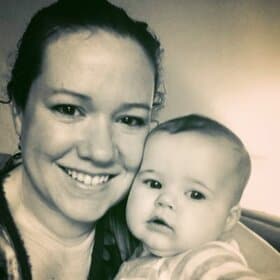
Research shows that overall, using daycare at an early age does not negatively impact your bond with your child. But the key is to build a secure bond with your child as early as possible.
In my experience, regardless of whether you are a stay-at-home parent or a working parent, your bond with your child is primarily dependent on how attentive and connected you are when you are with your child.
If you need to use daycare at an early age, focus on building a secure attachment with your child from day one. That includes providing attention, affection, and uninterrupted time together (even if it’s just 15 minutes a day). It also includes modeling skills, teaching independence, and encouraging independent play.
When the time comes for your child to attend daycare, no matter what their age, they will do well because they feel secure in their connection to you. (This will positively influence their ability to connect with their caregivers at daycare as well.)
Not only will they feel confident in your unconditional love and consistency, but they will feel confident in themselves, too.
Caitlyn Scaggs – Boldly Pursue

It takes being intentional to have a strong bond with your child – whether they attend daycare or not.
I do not believe the bond between a child and parent is negatively impacted if the child attends daycare. Although it can be difficult to see your child cared for by others, it is beautiful when you realize the value of the friendships and community they develop, starting from a young age.
It is also healthy when you can release the need to be the sole caregiver for your children and can step into a role where you are the most important caregiver of your children, surrounded by a village that supports you in your role.
Additionally, stressed-out and maxed-out parents can struggle to provide the best care needed for their children. Allowing others to support their parenting through quality childcare is a way to support everyone’s needs.
Outside of daycare, I have worked to have special moments, rhythms, and routines that keep us connected as a family. Although my children attended daycare from an early age we have kept a tight family unit.
One way I do this is by carefully protecting our evenings and weekends together. I work to preserve the opportunity for family adventures, quiet days at home, and growing alongside each other.
Jeanette Yoffe – Yoffe Therapy

It is wise for a parent to educate themselves about bonding and attachment. In child development when an infant is born, it takes a minimum of six months to two years for bonding to occur between the parent(s) and the child. Bonding is crucial for the parent(s), in this process they can learn how to attune to their child’s needs, explore their inner life and ultimately fall in love.
If a parent cannot be there for their child, as much as they would like, and need to place their child in daycare, I would suggest the parent provide “after daycare ABC care” AKA attunement-bonding-curiosity time, which includes floor time activities i.e., utilize playful interactive games, sit on the floor with the child, follow the child’s lead and “observe, watch and listen” for their cues, to maintain their strong bond.
In other words, “make up for lost time” so the parent feels secure in their relationship with their child, and the child feels “heard, seen and received.”
This continuous exchange creates the basis of object permanence, the ability to internalize the relationship as stable and trustworthy, even when a loved one is not by their side.
Debbie Rivers

The person the child spends the most time with has the most impact on their lives. So when the child starts attending daycare from an early age it will have an impact on the bond with their parents. However, the parents can manage this to make sure they have a strong bond with their child and that the child has a secure attachment to the parents.
1. Make sure you have a strong involvement in your child’s day-to-day life. Remember that all relationships take work and make sure you prioritize spending time with your child.
2. The reality is that you don’t have to do anything special to build a relationship. All relationships are made up of all of those little normal daily interactions you have throughout the day, the good and the bad!
You know, taking them shopping, bathtime, eating dinner together, having friends over for a play date, as well as having the chats about sharing. They all add up to keep the bond strong between you and your child.
3. Be available to them rather than too busy for them. Realize you don’t need to be perfect, just available. Children like their parents to be around and available to them, again it isn’t all about ‘quality time.
So take the time to communicate with them what you are doing. For example, it can be as simple as “I’m cooking dinner if you want to help me, or just know where I am”.
4. Listen! Be genuinely interested in your child and listen to them. Realize that connection and communication happen early and your children will learn from your example.
If you are always too busy to notice what they are doing, they will eventually stay disconnected from you. Take the time to encourage them as well.
5. Find a way to re-connect your bond after each separation. That will allow your child to feel secure that you always come back.
Jaya Jaya Myra

The bond between parent and child is a magical and powerful thing. I personally don’t believe that bond can ever be fully broken, outside of a truly traumatic experience. That said, everything we do, every single choice a parent makes will affect how strong or weak that bond is.
I don’t believe kids going to preschool at an early age is a deterrent to parent-child relationship IF the parent is fully present and loving when they are around. That takes extra work. It means you need to spend more time with your child when you are there, not just let them entertain themselves while you’re cooking, cleaning, or doing something else.
Basically, it depends on how present you are as a person, and how present you can be with your child. A parent who keeps their kids at home could very easily be emotionally distant by being preoccupied with other things: we all have chores and duties, right?
Your child will feel the bond based on how you interact when you are there, so if you cannot be fully present all of the time (in fact, it would be impossible to be fully present all of the time), having your kid in daycare where they get to interact with other people and caregivers, maybe a better choice.
Children who are too sheltered don’t become strong, capable adults. Oftentimes parents mistake this sheltering as love and mistake sending a kid to preschool as a bad thing.
On the contrary. You want your child to learn to connect with others and not be fully dependent on you for everything. Just be present when you are there, and the bond will be even stronger.
Siobhán Alvarez – Mimosas & Motherhood

As a mom of two little ones, one of my biggest fears with putting our boys in daycare at any early age was it negatively impacting the special bond that we have.
However, now that my boys are a little older, I’m able to see that putting our children in daycare of any kind of as infants and toddlers can actually be a wonderful way to help build their resilience and social-emotional skills, as long as it is somewhere that they feel safe and that has a positive feeling when we drop them off.
Children learn so quickly in those first few years, and our job as parents is to nurture them and help them grow into capable adults. A safe, positive and engaging daycare is a wonderful way to help our children learn from others.
I truly believe the best way to maintain our bond with our children when they are enrolled in a daycare program is to actively engage them in special playtime when they are at home. Read with them, play games, go outside on special adventures or just spend time cuddled up together.
Dr. Kevon Owen

Think correlation, not causation. Things would be different but not necessarily in a bad way. More time with parents can equal a stronger bond, however, you putting them in daycare does not equal a weakened bond.
Some people have no choice but to go to work so it’s important to keep in perspective the pros and cons. Cons: You get less time. Pros: Your child will get time with other adults and kids which will help them to be more resilient throughout school and life.
They’ll be around people for the rest of their life. Some may have really strong attachments with their parents but struggle to thrive and interact with others in social and academic environments.
When you’re with your kids, really be with your kids. In the absence of quantity go for the quality. Some people have neither, they’re gone all day for work and absent all evening with cell phones and tired. That has a negative effect on bonding and attachment. Be physically and mentally present and intentional about holding your kids and playing with them.
Avoid taking easy or time-sucking entertainment options like a lot of screen time. They’re like empty calories and will leave your child deprived of true attachment. Poor quality bonding does more harm than daycare.
Tiffany Schneider – Life Change Advice
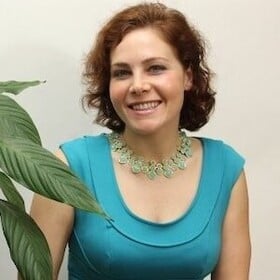
I don’t believe that the bond between parents and children is negatively affected by attending daycare as a toddler. What is most important for a child is to be in a healthy and positive environment that nurtures quality relationships with everyone they interact with.
If a child is in a daycare where their teachers give them individual attention, pay attention to their needs and enhance their growth, this is beneficial to the child.
If a mother is able to have some free time to herself or perhaps return to work in order to feel fulfilled, then the time she has with her child can be even more positive than spending hours on end together to the point of frustration.
What is important for the parental-child bond is to spend quality time together every day where the parents are focusing on their child (not on their cell phones, not on 10 other things at once). Another important factor in the wellbeing of the child and the bond between parents and child is playing together.
Pre-verbal children communicate through play. If toddlers are in daycare, put an emphasis on still having several hours in the day with their parents where they can play, interact, and feel physically connected to their parents.
Children and parents alike, discover themselves when they are out in the world. If they are able to have this time to explore themselves, then they bring these new discoveries to their relationship with each other. Keeping it fresh and renewed.
Gennifer Rose
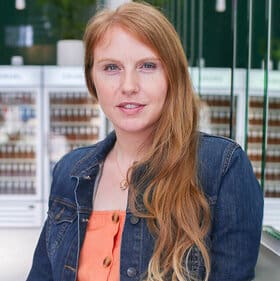
When my daughter was born my husband and I wanted to save money on childcare by keeping her home full-time while I worked from home.
By the time she turned one-year-old, I was completely burned out from always being on double duty and I needed a mental break. We put her in daycare so I could focus on work and give her the opportunity to be more social with other kids.
I was definitely concerned about her being in daycare affecting my bond with her, but I actually found that it was really healthy for both of us to have time away from each other. Her tantrums were less frequent and she would always be so excited when I picked her up from daycare.
At school her days were filled with friends and activities which were much more engaging than being home with me all day. Her teachers in daycare also helped my husband and I learn parenting skills, after all, we were new parents and it does take a village.
Mo Mulla – Parental Questions

In my opinion, the bond is not affected by daycare if you listen to your child and communicate about a daycare. Daycare is the best way to socialize a child. They find new friends there, learn lots of new things that probably parents won’t or don’t have enough time to do with their children.
Both of my children started going to daycare from the age of 1, they didn’t even talk and no even walk for certain. Children adapt very quickly and we came to a phase when they don’t want to go home, they need to play with their mate.
It is quite hard for a parent to adopt that somebody else is taking care of their child at this early stage. I think that is the most important thing to learn.
When parents learn this kind of thing by themselves it makes it easy for everybody. There is no disconnecting with your child, it makes a connection even better. They spend time without you and start more to appreciate how it is quite easy when you are around.
In my opinion, the best way to socialize a child is to go to daycare from day one. The bond between a parent and his or her child is not effective if parents don’t accept daycare as a chance for their child to learn and play.
Every day when I come to pick my kids up I ask, how did you spend your time? At the time they didn’t talk, I used to talk and get some head shake or “mm” it was enough.
When they started to talk, they started to explain what was the day like, what did they eat, play or draw. That was the time when I realized it is good for both of us, me and the baby.
My bond with my children becomes even better with this approach. When they become bigger every day I get a report, for breakfast it was…, we played on the piano today, I started to learn karate…..it’s enough, not to say pretty much for me.
Heather Little – Mom Thoughts

As a mother who works full time in Corporate America, runs a parenting website and operates a Real Estate Investment LLC, I had no choice but to have my toddler in daycare from a very young age. (Since 3 months old)
While there are many benefits to children attending daycare from an early age (increased socialization, routine educational development activities with trained professionals, etc.) it also means that the child is away from their parents several hours a day.
Here are some tips to follow to ensure the bond between parent and toddler stays strong:
Eat Dinner Together – Keep the TV off. Simply eat meals and actively engage with your toddler. Talk about their day, listen to your child’s feelings, understand your child’s perspective on things, ask them about their friends, their favorite cartoons, etc. Be involved.
Make The Weekends Count – Don’t let yourself get caught up in a long list of “To Dos” when the weekend rolls around. It’s okay to let dishes sit in the sink. It’s okay if the laundry is getting piled up. Take your toddler to the park. Go on a family adventure to the Zoo, or a day trip to the beach. Do fun crafts, run around in the yard, just have FUN.
Have A BedTime Routine – Use this time for some final bonding moments before the sun rises and it’s back to daycare. Snuggle up and read a nice book and sing a couple of songs.
Be Involved With Their Daycare – Ask your toddler questions about what they did at daycare. What was their favorite part of the day? Did they learn anything new? When daycare has events where the parents can attend, GO. Be a PART of your toddler’s daycare life.
Ditch The Guilt – When you’re feeling guilty about sending your child to daycare, those emotions will unintentionally impact your toddler. Toddlers are surprisingly intuitive! Remember, the social interactions and educational experiences they receive on a daily basis are incredibly beneficial to them!
Jason Leung – The Rockstar Dad

Stay engaged with your child from the beginning and your bond will not go away. The bond between a parent and child should not be affected by them attending daycare at an early age unless that bond was not strong, to begin with.
When a child is born, they depend on the parents for everything. So this should create a strong relationship right away. It’s important for the parents to continue to engage and show a strong presence while the child develops and grows.
If this is not well established, then the bond can diminish when the child spends less time with the parent or they see another authority figure come into their lives. But this result shouldn’t be determined by how early a child starts going to daycare or school.
Different parents have different situations. Some have to work full time and must rely on nannies or daycares to look after their child. But it is important for all parents to put in their best effort to always spend as much time as they can with their child.
Play with them regularly, develop routines with them (like going for daily walks), involve them with your chores as much as possible, say good morning and good night to them every day.
You may have a limited amount of time every day, but just your regular presence alone helps build on their sense of security and trust. And this should last forever. And if you feel that you’ve lost the bond, it’s not too late to re-engage.
Allie Schmidt – Disability Dame
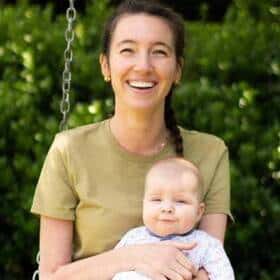
I don’t believe that a parent-child bond will be broken no matter how early your child attends daycare.
The bond may be superficially affected in that your child may become less dependent on you because they are receiving care from another adult and socializing with other kids their age, but this doesn’t mean that your bond is broken. At a certain point, they have to become more independent.
I have a 16-month-old son, and we’ve had a nanny ever since he was born. However, we want to move him into daycare within the next six months. I want him to participate in more activities than what I could provide inside of my home and I want him to socialize with other children.
I’ve been with him every day since he was born, but I feel like it’s time for him to experience some new things outside of my care! I’m not worried about how this will affect our bond, because, ultimately, I’m his mother and nothing can provide a greater sense of comfort than me.
Tracy Murdock – Your Twin Mom

When I was still teaching outside the home, I had to send my twin toddlers to daycare and it was hard for me to leave them. I prayed and God helped me to see ways to bond even in those times.
It was about how we spent the time together that mattered, even if they were at daycare for a big part of the day. I made sure we had our routine of reading family books together, bedtime cuddles, and morning prayers.
I knew it was a temporary season for us before I felt called to homeschool and God provided what we needed. My twins knew mommy loved them no matter where they went and I knew God was with them, even when I couldn’t be present.
It helped to ask for pictures of their day from their daycare teacher so I could check-in and ask them about their day. They loved sharing their activities with me and making new friends. Daycare was a part of their path in their early years and our relationship has grown as time has passed because God works in their hearts, no matter where they go.
Jacqui Olliver – End The Problem

I see the biggest challenge here as being threat-based rather than reward-based programming. Children are being imprinted and programmed by what they see and feel between the ages of 1-7.
This is especially important for parents to know because they generally have the most contact with the child and therefore are having the biggest impact on how their child develops as a person.
Your bond is influenced by how YOU are being and feeling and how you are communicating that in each moment to your child. A helpful point of focus to keep in mind, is how am I programming my child right now?
This will help to keep you in check so you can reel yourself back in and stay focused in the present moment, so your communication is coming from an emotionally empowered state.
Your child needs to know that you believe in them, so stay focused on your child’s strengths, and use your imagination to imagine the best outcomes for them! This will help you both bond, and instil a sense of confidence plus better emotional development and social development in your child.
Focusing on imagining the best outcomes will also reflect in your physiology. This is important, because 93% of our communication is non-verbal, and at a young age, this is what your child understands and is programmed by.
Ariella Lew – Kids on Track

I believe that childcare is an environment in which children are able to thrive even when they are very young.
When parents feel overwhelmed or have reasons to send their child to childcare such as work pressures, the best thing for them and their child is to be in an environment with appropriate love, stimulation and socialization.
Many childcares have this and it is all about finding the right center for your child where parents feel that the center is part of the extended family unit. In doing so, the healthy relationship or bond remains intact as children can sense their parents chose carefully and want them looked after.
When children are in childcare from such a young age, parents can also pay attention to making sure the time spent with their child in the evenings and at weekends is filled with adventures and bonding time to ensure that these relationships can be nurtured and strengthened.
Michelle Meredith – Bright Color Mom

I do not believe sending a child to daycare at an early age has a negative effect on children. The old saying still applies here: quality over quantity. As long as the time spent with them after work is engaging, positive, and used to build the child’s self-esteem, they will build an incredible bond with their parents, plus have secure and healthy attachment with parents.
Furthermore, daycare is a way to encourage a toddler to have healthier relationships with everyone, especially their parents.
Younger children who spend 100% of their time in the early years exclusively with one parent are more likely to form an unhealthy attachment to that parent. They may find it difficult to build meaningful relationships outside of their immediate family as they get older.
Nicoleta Iudean – What Do Kids Want

As a mom with two young children – I can definitely say that attending daycare, since they were both little under 2 years old, was a positive relationship experience for my kids as well as for us, their parents. We needed to work and had no help, daycare was the only option so we had to make the most of it.
It’s not only about how much time you spend with your children but also about the quality of that connection. In daycare, children spend time with other children, they get to experience their first social interactions to boost the child’s mental strength, play together and learn new skills at a fast pace.
The activities they are engaged in are very well structured and enable new cognitive acquisitions suitable for their age.
To avoid a negative impact of daycare on toddlers – parents should take the time to spend quality time with their child in the afternoon and on weekends, parenting style aside. These are good moments to play fun games, get outside, take a bath, have dinner together, read a bedtime story, or…just laugh.
Laugh a lot, sing, dance, engage in active play with the child, and constantly reinforce the current situation: just like mom and dad go to work every day, the daycare is sort of the child’s “go-to-work” place good for children’s development.
Reinsure the child every day that she is safe, you love her, daycare is fun, and afternoons are a blast and you can’t wait for her to come home.
It’s also important to let the child discharge at home from all the happenings of the day. Daycare may seem scary for them in the beginning, so it’s the parents’ role to hold her and comfort her.
My children would often cry or have tantrums at home, and that’s ok, as at home is where they feel safe, and need comfort. Step by step and day by day, the insecurity and anxiety will turn into an “I can’t wait to go to daycare” attitude and healthy relationship.
Adam Shlomi – SoFlo Tutors

Spending quality time with children is crucial to building the bond between parent and child, but for working parents spending that quality time every day is not possible.
Between errands, work, and taking care of other siblings, parents do not have time to care for a child during the day. Daycare is a necessity.
So families ought to make up for daycare by spending quality time in the evening. For example, having dinner at the kitchen table multiple nights a week, or having family outings on the weekends.
Quality time between parents and children is important, so we must make time to build family bonds outside of the workday.
Michael Fray – Yearist

Childcare for toddlers, just like school for children and high school for teenagers, are not inherently able to detract from the bond between a child and their parents.
While this is an understandable concern for parents, your positive relationships with your child is more dependent on the way that you spend time with them, and this does not have to be all day every day.
It is more important to focus on spending enough quality time with your young children to establish a close connection, and this can be done with or without your child spending some of their time at daycare.
In saying this, if you spend a lot of time away from your child (for example, when you are at work), it may take some conscious effort to ensure that you are making the most of the time you do have with your child. Particular emphasis should also be placed on being physically and emotionally present.
It also may be useful to think about what kind of environment your child is surrounded by. Both the childcare provider and the child’s family have a responsibility to provide a positive environment that encourages exploration and fosters mental growth.
Dana Basu – Ever Grow Therapy

Attachment is the invisible, ever-powerful dynamic that keeps us coming back to the ones we love. There are 4 main components:
- Bonding (the connection we have between ourselves and our babies)
- Attunement (our attention to what our babies are trying to communicate, through their cries, their facial expressions, and their body language)
- Responsiveness (when we use the information we gathered through our attunement to respond to our baby’s needs and desires)
- Consistency (putting the pieces together to identify and respond to our babies’ needs regularly and predictably over time)
The more time we spend with our babies, the more opportunities we have to meet these needs. And if we never spend time with our babies, or only very little time, this greatly impacts our ability to meet these needs.
But parenthood isn’t about perfection, and instead the goal is to be “good enough.” This means that sending our children off to daycare will have an impact, but it doesn’t need to predict our attachment relationships. There are lots of things that we as parents can do to still invest in that relationship.
For some families, they might be able to delay the age in which kids start daycare or reduce the number of hours per day in which they’re there. For those families that aren’t able to make those adjustments, they can still build that attachment relationship through their interactions with their children whenever they are together.
Things like putting the phone down when they’re interacting together, showing curiosity in them and their interests, helping them through the struggles they encounter when they are with you, etc. It’s all about making the most of the time when you are together.
Shana Bull – Randall the Blue Spider Goes Surfing

Prior to sending my son off to preschool at age two, he stayed at home with a nanny, while I worked from my office down the hall.
When my husband and I sent him off to school full-time, I was worried that I would miss out on important milestones and that he would get more attached to his teachers because he wouldn’t be seeing me as much.
What I discovered was that my own mental well-being and work productivity increased by having him outside of the house. It took some adjustment but I soon found I was able to focus better without hearing him from the office, and always worrying about him even though a nanny was taking care of him.
When I would pick him up from school I would make a point to talk to him even when he couldn’t talk back, and sing and dance along to children’s songs on Spotify in my car.
Once we got home my husband or I made it a point to play for just a little bit before we would have to start making dinner for the night, etc.
The bond that I had with him never went away, and now he is back in preschool and he loves telling me every detail of his day when I pick him up from school.
Kate Tekurio – Kateable

I personally think this one choice cannot affect the relationship, but rather it is a collection of choices and things.
For example, I believe it lies more on the parent and child relationship and how it is regardless of how much time they spend together. No matter how much time and attention you give your child, they will always want more.
If the time you spend with them is sincere and focused on them, even if it isn’t all day will mean more to your relationship.
Conclusion
Do fun and educational activities with your kids, don’t let your attention be distracted by TV or by social media. Your children need you to support them, to tell you about their day, advise them, and comfort them when they had a bad day.
Your children must be aware they can always rely on you, even if you aren’t present all the time.
The experts also agree that it is beneficial for a child to interact with other children and adults but for the best results, you should find a daycare in which the caregiver adult is experienced and takes care of a small number of children.
Thank you so much to all the experts that have contributed to this expert roundup! Please share this post with your friends and followers on social media.
—
